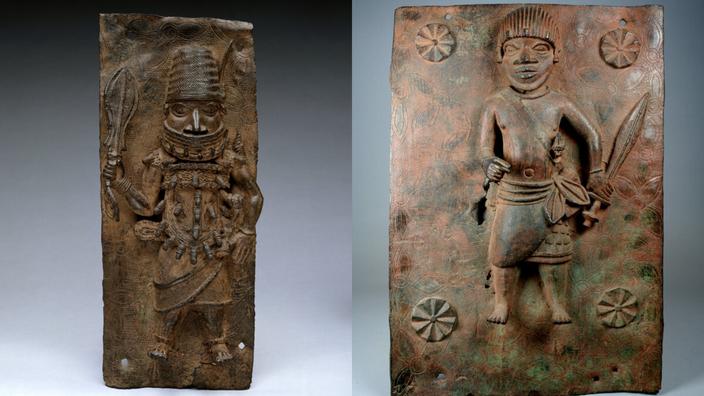This is probably not the last restitution to be expected.
The Metropolitan Museum of Art (Met) announced Wednesday to return to Nigeria three old objects from its collection: two bronze plaques from the Kingdom of Benin, dated to the 16th century, as well as a brass head from the city-state of Ife , dated around the 14th century.
The move follows discussions with the British Museum and Nigeria's National Museums Commission, said the Met, which has removed the objects from its galleries and withdrew them from its inventory.
The three bronzes are now waiting to be collected in New York by a Nigerian delegation.
Read also: Germany undertakes to return part of its Benin bronzes
The three objects were not chosen at random, but because of their recent fraudulent journey. Exhibited for thirty years at the Met, the two restored bronze plaques were part of the collection of 131 African art objects donated in 1991 to the New York museum by the art dealer Klaus Perls (1912-2008). A century before this donation, however, these objects belonged to the 900 or so plaques that adorned the royal palace in Edo (now Benin City, Nigeria): looted in 1897 during the sacking of the site by British troops, they have been disseminated in Europe then in the world, within large museums, like the British Museum, in London or the Weltmuseum in Vienna. Kept until 1950 between the walls of the great British museum,the two Met plaques returned Wednesday had already been returned in 1950-1951 to the National Museum of Nigeria, along with 24 other objects, before disappearing under unclear circumstances and then resurfacing on the New York art market. The third object, the brass head, had been fraudulently sold to the museum.
As the Metropolitan Museum explains, this restitution is part of the process of better taking into account the route of certain objects in its collections. The museum, which continues to exhibit more than a hundred objects linked to the looting of African heritage, and in particular of the kingdom of Benin, has worked on updating its digital collections and its various mediation spaces in order to better showcase these objects and their history.
"The Met is pleased to have taken the initiative to return these works and is committed to being transparent and responsible in its collection of cultural goods"
, the museum said in a statement on Wednesday.
As symbolic as it is - the Met has some 160 objects from the looting of the Edo Palace alone - this first gesture was greeted by the Nigerian authorities familiar with the matter.
Read also: Restitution of looted property: a new course for France
"We sincerely appreciate the transparency shown by the Metropolitan Museum of Art regarding the issues that led to the return of these objects,"
said the director of the National Museum Commission of Nigeria, Abba Isa Tijani, who is expected soon in New York to receive the restored bronzes.
"We welcome the rapprochement that is taking place in the world of museums and appreciate the sense of justice shown by the Metropolitan Museum of Art
," also greeted the Nigerian Minister of Information and Culture Alhaji Lai Mohammed.
Nigeria invites other museums to be inspired by it. The art world can be better if every holder ofcultural objects takes into account the rights and feelings of dispossessed people ”
.
Asked by the
New York Times
about the possible return of other objects from the kingdom of Benin kept within its walls, the Met simply replied that no other additional restitution was envisaged for the time being.
Multiplication of refunds
An international movement for the restitution of African historical objects has been on the rise in recent years. In Germany, the inauguration of the Humboldt Forum had provoked a lively public debate about the important collection of bronzes from Benin kept by the museums of Berlin. A turning point in the attitude of the German government,
"substantial renditions"
were ultimately announced last month. Same story in the Netherlands, where the government decided in February to set up a committee to verify the provenance of objects kept in collections which would have been
"unjustly" created
during colonial times.
“Due to the power imbalance in colonial times, cultural objects were - in fact - often stolen,”
the Dutch government admitted earlier this year. In France, the submission of the report by historians Bénédicte Savoy and Felwine Sarr in 2018 has so far only resulted in the return - by the end of the year - of 26 objects in Benin.
A sign that the mobilization is also gaining ground in African countries, several modern museum projects are currently under construction around the Gulf of Guinea. In Nigeria, in Benin City, a large museum of art and history, designed by the British-Ghanaian architect David Adjaye, should open in 2025, with the stated hope of exhibiting the heritage of the kingdom of Benin kept abroad. In Benin, a museum of the epic of the Amazons and the kings of Danhomè is also under construction in Abomey, where it is being built in partnership with France. On the other hand, the commitment of European states to the restitution of at least part of the collections made up in a colonial context remains very variable from one country to another. The management of the British Museum, in particular, refused untilnow to evoke the slightest restitution of more than 900 objects from the Benin kingdom. An inflexibility that does not only concern extra-European objects, as British Prime Minister Boris Johnson once again recalled, who in March ruled out any restitution of the Parthenon marbles.




/cloudfront-eu-central-1.images.arcpublishing.com/prisa/BRRQWHKHTBFDJJ6EREN2ZD5LLE.png)

